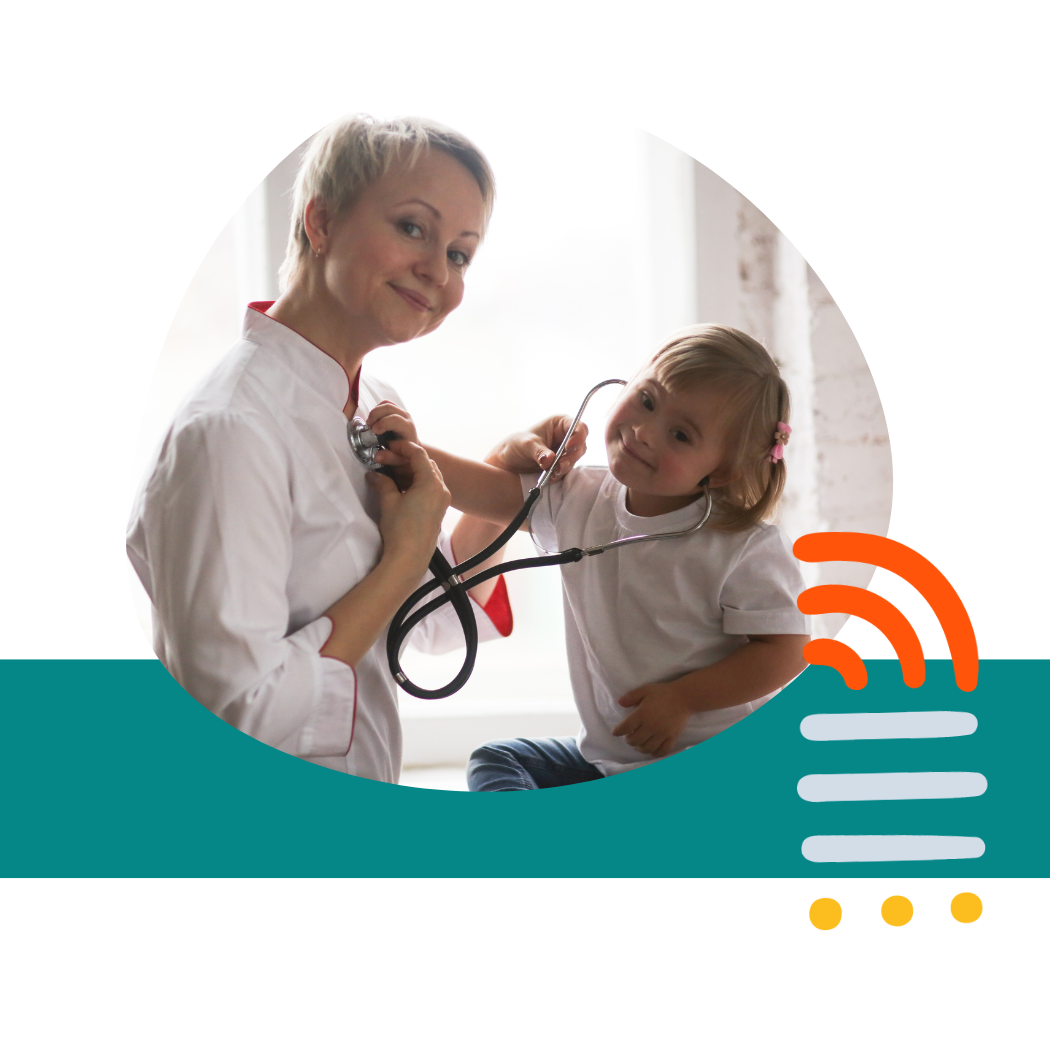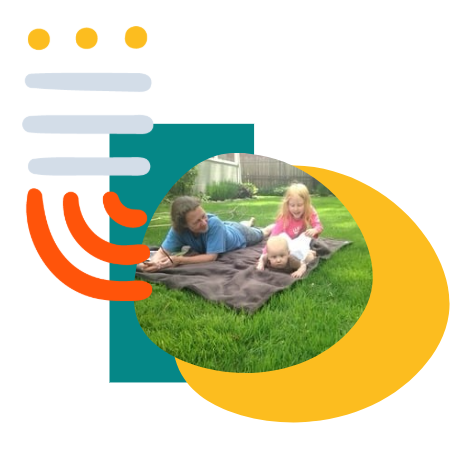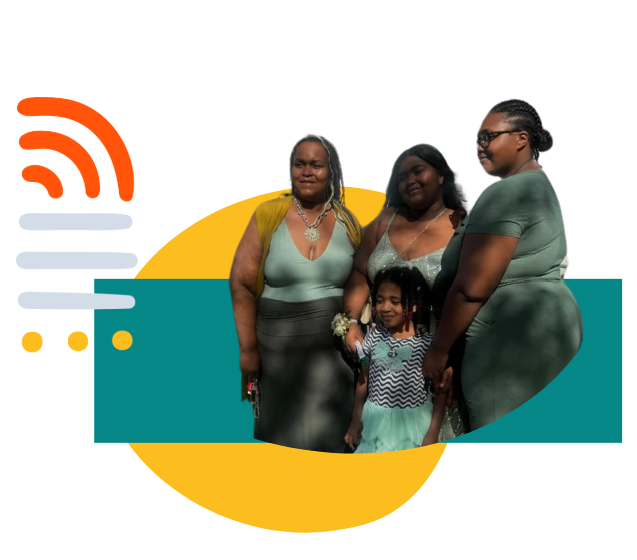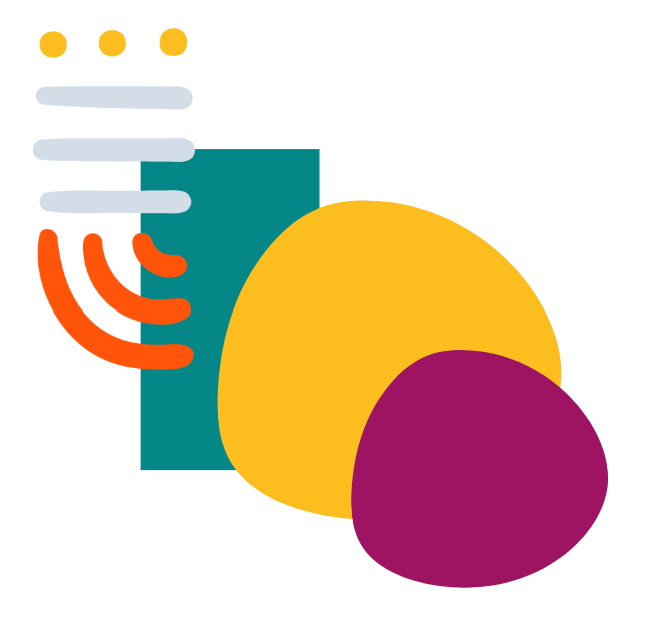
This March, Nurture Connection is honoring Developmental Disabilities Awareness Month and shining an Early Relational Health (ERH) spotlight on the unique journeys of parents and caregivers who care for children with significant health needs. The following is adapted from an interview the Nurture Connection editorial team conducted with Bryn Fortune (Coordinator, ERH Family Network Collaborative, and Nurture Connection Steering Committee Member) and Mia Halthon Jones (Parent Leader, ERH Family Network Collaborative, and Nurture Connection Steering Committee Member) about their personal experiences as parents of children with disabilities.
Thank you both for taking the time to reflect with us on your parenting journey! Would you each be willing to share a little about yourself and your relationship to caring for a child with disabilities? How did that story unfold for you, particularly in the early years of your child’s life?
Mia: My daughter is on the spectrum and was nonverbal in the early years of her life. She didn’t make eye contact for at least three to four years with me, and I was worried: Am I doing the right thing? Am I doing something wrong that I didn’t do with my son, that is making her have these issues? And then to come to find out, well, no, she actually has autism and she’s on the spectrum. And so these are natural things that occur with [this condition].
Doctors and social workers would say, “This is just how she’ll be” . . . but it really wasn’t that. As I started actually doing Early Relational Health with her and making that connection (and having teachers who made that connection with her, too) — that is why she got to where she is today. Without [those connections early on], I don’t think she would have achieved milestones like getting her high school diploma and a bachelor’s degree.
Bryn: My daughter was born with very significant health issues. By the time she was five years old, she’d lived many months of her life inside a children’s hospital, and she had a two-and-a-half-year-old sister. So managing to be a family when many months of your home environment doesn’t have your family together is its own challenge.
There was never a time before age eight where she didn’t need attention around the clock. I was very sleep deprived for the first six years of her life. And I don’t know how I functioned, but like all parents I found a way to do it.
How did ERH play a role in developing your relationship with your child?
Mia: Having a child with a disability brings back so much to me in this space of Early Relational Health. Sometimes, you’re so in the moment of diagnosis or the disability, or the family dynamic, that you could miss those early moments and connections with the child because you’re so worried about everything else. This work is really important to parents who are in that space, because they really need that extra help. Because they’re also dealing with not just having a normal child and making that connection, but making a connection with the child that has a disability.
Bryn: When my daughter was born and in her early years of life, her physical health was very fragile and uncertain. And I was so afraid of the pain of that loss that I actually didn’t emotionally connect with her. I couldn’t have told you that at the time. What I knew was I was experiencing something very different than I had with my oldest daughter, where ERH was very natural. But the chaos in the situation and the fear and constantly being on duty — when you have that much, that actually depends on you to be responsible for, and feel you need to keep this little one’s body alive, you are so worn out and fatigued, and you are in so much fear and pain. So a lot of my lived experience and expertise about ERH is when it’s not in place and what I have learned.
What kinds of support did you receive — or that you wish you had received?
Mia: My mother was my only informal support, and my church family. I always say, If the parent is not okay, the child is not okay. And I didn’t feel okay.
But once my daughter got into elementary school, her teachers cared about whether I was okay and how I felt about it. They just went above and beyond. For example, with autistic children, everything is sensory. She wouldn’t let me do her hair, so her teacher did her hair in the classroom — and that was preschool. They said, “Well, will you give us permission?” and I said, “Oh, yes, I will!”
Bryn: Our issue was we had just moved to a new state and didn’t have any informal support or social connections except my mother, who would frequently fly to Detroit to support my oldest daughter while my younger daughter was hospitalized. We were very isolated. And the formal support systems were not coordinated and in fact were very fragmented at the time. Special education in schools was still segregated. I had to go through a negotiation process to get my daughter into a classroom that was not all children receiving special education services. There’s no ifs, ands, or buts about it; it is not the formal system, it’s the informal system that supports people to hold together as a family during difficult times.
In that zero-to-three time frame, my daughter had multiple diagnoses and care plans. It was very overwhelming when as a family you are just trying to figure out how to live life and all these plans just added to the chaos. This is the time when I wish someone would have asked me what our family’s informal support system looked like and supported me to discover how to strengthen those relationships.
“There’s no ifs, ands, or buts about it; it is not the formal system, it’s the informal system
that supports people to hold together as a family during difficult times.”
—Bryn Fortune, Coordinator, ERH Family Network Collaborative
& Nurture Connection Steering Committee Member

What are some of the challenges and other compounding factors that came up for you on this journey?
Mia: Having a child with a disability and coming from poverty, it’s really hard. I was the sole [source of financial support], and my mother really never worked. So when I had my daughter, I was 21 and I had to take care of my whole family, which was hard. I’m working and going to school and then trying to take care of two kids. It was very tiring. And it just seemed like there was never enough time in the day. There were never enough people to care. It just seemed like it was just never enough.
When my daughter got her diagnosis, I decided it was much more important for me to put my education aside, because I couldn’t work and go to [my] school and go to school with her. So I had to let one of those go. We think about dreams that parents let go in order to make those connections in order to, you know, be there for their children. . . . When you’re in a middle-class or upper-class family, that’s not always a decision that you have to make.
Bryn: It’s well known that most marriages don’t survive in the long run when they have a child with significant health issues. And there’s a grieving process. A question I would ask myself at various times was, “Will my child die tonight?” It’s very difficult to live in those circumstances. And I was so afraid of the pain of that loss that in the early months I didn’t understand the importance of or have the capacity to emotionally connect with my daughter — and this is what ERH is about.
When you reflect on your experiences as a parent following your child’s diagnosis, are there other unexpected places that this journey has led you to?
Bryn: There’s this short essay [about parenting a child with a disability] where you’ve dreamed of this vacation that you’re going to Italy, and then your plane takes you to Holland. In many ways that is the journey of disability. You’ve planned on something in your dreaming . . . and you have wound up in an incredibly different destination where you know nothing about the environment. And you have to reorient your dream. And it also means it’s critical you grieve the loss of your original dream.
In my story, what I didn’t have was permission for myself to emotionally grieve and give myself time to process the loss. And that actually is a critical juncture to then finding all the gifts of the journey that you wouldn’t have chosen to learn in this way. I am who I am and I do what I do today because of this story of my life.
Mia: When we talk about the joy, I had dreams; I was going to school to be a nurse, because I really wanted to help people. But taking care of my daughter and my other children with disabilities — it wasn’t a dream deferred. It became a new dream — being in this work with Early Relational Health, advocating through my lived experience, working in a school with parents. [I now understand that] it was just showing me that you can do this, just in a different way.
“Remember that you are an individual outside of what you may be dealing with with your child.
Your best is always enough.”
—Mia Halthon Jones, Parent Leader, ERH Family Network Collaborative
& Nurture Connection Steering Committee Member

How can a relational health paradigm shift help parents who may be navigating these kinds of healthcare experiences feel more heard and seen?
Mia: We need more trust and authenticity, with parents and professionals. With doctors, it was very transactional: Here are the care plans, you need to do this, you need to do that. I didn’t feel like they were there for me. And if you don’t feel like you can even talk to your healthcare, your pediatrician or whatever, you’re not gonna open up to them. So they won’t know that you’re struggling or if something’s going on like postpartum depression, because you’re not connecting with them [which] could impede your connection with your child.
I just needed someone to ask me, “Are you okay? Is there anything we can do to help? Are there any other resources that we can help you with, or direct you in the right direction, or just to care?”
Bryn: So I was rewarded as being a really good parent [in these healthcare settings], because I could step into being transactional. The system [in many ways] rewarded you for being transactional — to not show your emotions, to take care of business. So the system was actually set up to shoot you in the foot [when it came to] the relational dimension, ’cause you are gonna be rewarded if you didn’t take it there. You were strongly encouraged to be transactional. It’s how you got more information about your child and what is really happening.
Mia: I totally agree, Bryn. You’re “the good parent” if you’re not overemotional; you’re gonna take this plan and execute it. You’re not crying about everything, even though you have all these problems and issues. You’re the good parent.
Bryn: And it’s a huge problem. I didn’t know it at the time, but I was dealing with very, very deep depression . . . but I was so high functioning transactionally. I knew how to wear the mask. So there was no insight that I was struggling. Things stabilized where by the time she was five, she was down to eight hospitalizations a year, and it wasn’t half the year. And I could find a collapsed space of “Oh, my God, what is wrong with me?” and unpeel my healing journey of depression that had gone on. I had buried all those emotions and all those feelings; you can’t bury something for five years like that. That level of grief, and that level of pain that you weren’t ready to confront. You don’t just get to go to one session and be done; you gotta heal from that stuff.
What would each of you tell a parent who may be just starting out on this journey?
Bryn: Well, I might tell them because they’re at the beginning of the journey — change the order with whoever they’re encountering in these formal spaces, all those professionals. Instruct them to “Ask me how I am, ask me how my family is, and you listen to me. That’s what I most need from you. That’s the best service you can offer me.” Because it opens up a space for someone to then be a real person. Just because professionals feel pressured with limited time (rightfully so), don’t let that block the opportunity to build a relationship so you can have faith in all the “transactional” information you want them to share so you can learn.
Mia: Remember that you are an individual outside of what you may be dealing with with your child. Your best is always enough. The love for your child will carry you through.
My daughter’s biggest superpower is her sense of humor. She can go into a room and make everybody laugh. The journey was so much but also worth it. I wouldn’t change anything.
“I am who I am and I do what I do today
because of this story of my life.”
—Bryn Fortune, Coordinator, ERH Family Network Collaborative
& Nurture Connection Steering Committee Member
